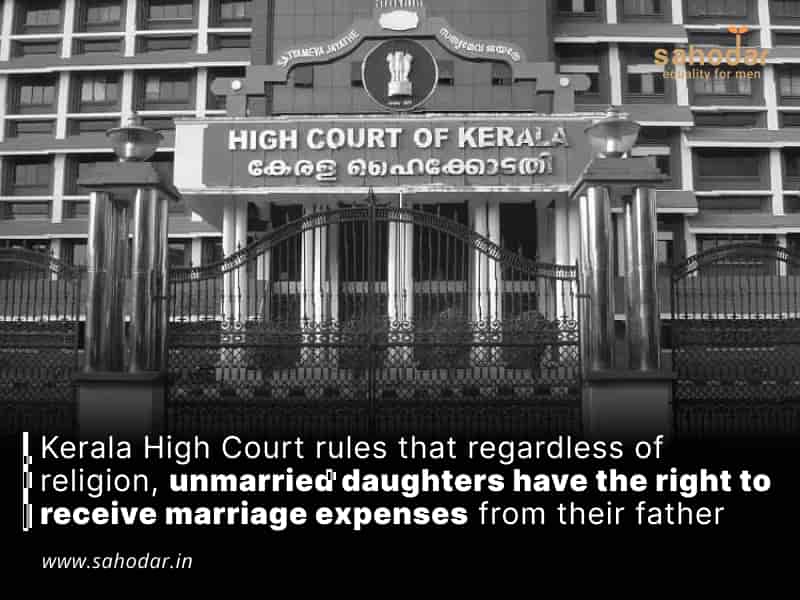“The right of an unmarried daughter to get reasonable expenses concerning her marriage from her father cannot have a religious shade,” the Court said.
The Court emphasized that the entitlement of an unmarried daughter to receive reasonable marriage expenses from her father should not be influenced by religious considerations, the Court stated.
“The right of an unmarried daughter to get reasonable expenses concerning her marriage from her father cannot have a religious shade. It is a right of every unmarried daughter irrespective of her religion. There cannot be a discriminatory exclusion from claiming such a right based on one’s religion,” the bench said in its judgment.
The High Court’s decision was based on two petitions submitted by two unmarried daughters of the respondent-father. The petitioner-daughters had approached a family court to claim ₹45.92 lakh from their father for their marriage expenses, and requested a decree to establish a charge on their father’s property to secure the amount. Additionally, they sought a temporary injunction to prevent their father from selling the property, which they alleged was purchased with assistance from their mother and her family.
The family court determined that the petitioners were entitled to claim only the minimum necessary expenses for their marriages, and therefore ordered an attachment of ₹7.5 lakh to protect their interests.
However, the petitioners challenged this order in the High Court, arguing that the family court failed to consider the parties’ status when determining the amount of ₹7.5 lakh as sufficient to cover the expenses of both their weddings. The petitioners highlighted that they are both currently pursuing higher education and their father has not provided them with any financial assistance for their expenses.
In contrast, their father maintained that he is the sole owner of the property and building, and that he is not obligated to pay any amount to his daughters.
The father further argued that his daughters and their mothers are Pentecost Christians, and that their religious community does not practice the use of ornaments in marriages. Therefore, he contended that the expenses typically incurred for gold ornaments in weddings would not be applicable in the case of his daughters.
The main issue before the High Court was whether there is a legal provision that entitles a Christian daughter to claim marriage expenses from her father’s immovable property or its profits.
The Court acknowledged that there is a statutory provision in Section 3(b) of the Hindu Adoptions and Maintenance Act, 1956, which enables a Hindu daughter to receive reasonable expenses for her marriage.
The Court also referred to a previous case, Ismayil v Fathima & Anr., where the Kerala High Court had addressed the question of whether a Muslim father is obligated to pay for his daughter’s marriage expenses. In that case, a division bench of the Court had concluded that not only Muslim fathers, but fathers of all religions have an obligation to fulfill such expenses.
“We unhesitatingly agree with that view,” the Court said.
The Court then noted that under Section 39 of the Transfer of Property Act, if a person has a right to receive maintenance, advancement, or marriage expenses from the profits of an immovable property, that claim can be enforced against the property of the person who is obligated.
Accordingly, the petitioner-daughters are entitled to claim a charge on their father’s immovable property, the Court declared.
However, the Court stated that once the property has been attached, there is no justification for claiming an additional equitable relief of injunction.
Regarding the amount of money required to cover the expenses, after considering the pleadings and evidence on record, the Court determined that an attachment to secure an amount of ₹15 lakh would be sufficient to protect the interests of the petitioners.
The petitioners were represented by advocates Jacob Sebastian, KV Winston, Anu Jacob and Divya R Nair.
The respondent was represented by advocates Shyam S and NK Karnis.
Source: https://www.barandbench.com/news/unmarried-daughter-right-get-marriage-expenses-father-irrespective-religion-kerala-high-court

